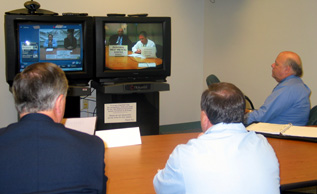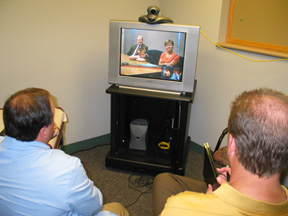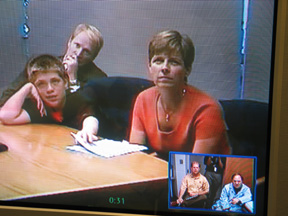 |
From UNMC’s Munroe-Meyer Institute, Joseph Evans, Ph.D., and Brad Schaefer, M.D., participate in the governor’s statewide telehealth conference. Max Thacker, associate director of ITS Video Services at UNMC, is on the far right. Photo by Vicky Cerino. |
Eventually, the Nebraska Statewide Telehealth Network will connect to every Nebraska hospital, local public health department, state and regional public health lab and key state agency. A key part of the network will allow genetic specialists at UNMC’s Munroe-Meyer Institute to connect with patients at Regional West Medical Center in Scottsbluff and Good Samaritan Hospital in Kearney through videoconferencing technology.
“This new network is the answer to a longstanding desire to be able to provide the resources of UNMC to health care professionals and local health departments across the state,” said James B. Milliken, president of the University of Nebraska system. “We can now provide diagnostic and consultative services in real time. The most important implication, however, is that health care for Nebraska citizens will be markedly improved.”
The telehealth system is the first in Nebraska for children with special health care needs.
 |
Foreground, left to right: Brad Schaefer, M.D., medical director of Munroe-Meyer Institute, and Brett Kuhn, Ph.D., psychologist, Munroe-Meyer Institute, talk with the Massey family of Scottsbluff. In the middle of the television screen is Jacob, 13, who was born with Fragile X syndrome. He is the son of John, far left, and Megan Massey. The photo was taken about a month ago. Photo by Walter Brooks. |
Delivering more accessible specialized services is critical to serving Nebraskans, Dr. Schaefer said. “Our services provide important benefits to children. Rehabilitation services help children develop better – in speaking, walking, in their daily activities – and this improves their quality of life and that of their family. When the child does better, the family does better and that’s good for Nebraska.”
 |
The large screen depicts a live view of the Massey family of Scottsbluff talking with Brett Kuhn, Ph.D., psychologist, at Munroe-Meyer Institute and Brad Schaefer, M.D., medical director of the Munroe-Meyer Institute and chief of clinical genetics at UNMC, who are shown on the small screen in Omaha. The photo was taken about a month ago. Photo by Walter Brooks. |
John and Megan Massey are the parents of Jack, 15, and Jacob, 13, who were born with Fragile X syndrome. Fragile X is the most common inherited cause of mental impairment and the most commonly known cause of autism. For their disease, the teens take anti-anxiety, blood pressure and other medications, and receive a variety of therapy, including speech and occupational therapy.
“It’s very comforting and wonderful that more families will have access to, and more frequent visits with, geneticists from UNMC,” said Megan Massey, who has worked with Dr. Schaefer since her boys were 6- and 8-years-old. “It’s going to be incredible to have more frequent access to specialists. When you have a child who has a handicap, it’s hard to wait three months to see specialists. You want to know what’s going on. In addition, this service will make more resources available for those who don’t have the resources or ability to seek these specialized services away from home.”
Dr. Schaefer’s team sees about 2,000 Nebraska patients a year on the road. The telehealth network could enable specialists to conduct 4,000 more patient visits a year, which would serve about 3,000 patients and their families, he said.
That’s a marked change for Munroe-Meyer Institute genetics specialists who have traveled to eight sites across Nebraska over the past 30 years. The team, composed of a genetics physician, genetics counselor, developmental pediatrician and child psychologist, generally travels outside of Omaha 45 times a year to conduct clinics in Scottsbluff, Columbus, Grand Island, Hastings, Kearney, Lincoln, North Platte and Winnebago. Scottsbluff is a 487-mile, 7-hour and 22-minute trip.
Although in-person clinics will continue, the telehealth network will reduce the three-month interval between patient visits and make specialists accessible for medically urgent matters that usually require the patient and family to travel to Omaha or Denver. In addition, patients and families will have access to all of the institute’s specialists, including physical, occupational and speech therapists.
UNMC genetics and behavioral specialists have conducted more than 50 patient sessions since the system began operating four months ago.
The psychology department has been providing pediatric behavioral health services to Scottsbluff and the Good Samaritan Telehealth Network based in Kearney and other sites. Using this technology, these psychologists are working with children and families with behavioral, developmental and emotional concerns.
“This new network will allow UNMC to extend our reach to all of the hospitals in the state,” said UNMC Chancellor Harold M. Maurer, M.D. “It also will improve preparation for natural disasters and man-made emergencies. The physicians and scientists at the Nebraska Public Health Laboratory at UNMC believe this network will improve their ability to provide faster responses to a wide array of public health challenges.
Of the 20 clinical geneticists, genetic counselors and developmental pediatricians in Nebraska, all are in Omaha, Lincoln or Fremont. In addition, the majority of child psychologists and mental health care professionals are concentrated in the eastern part of the state.